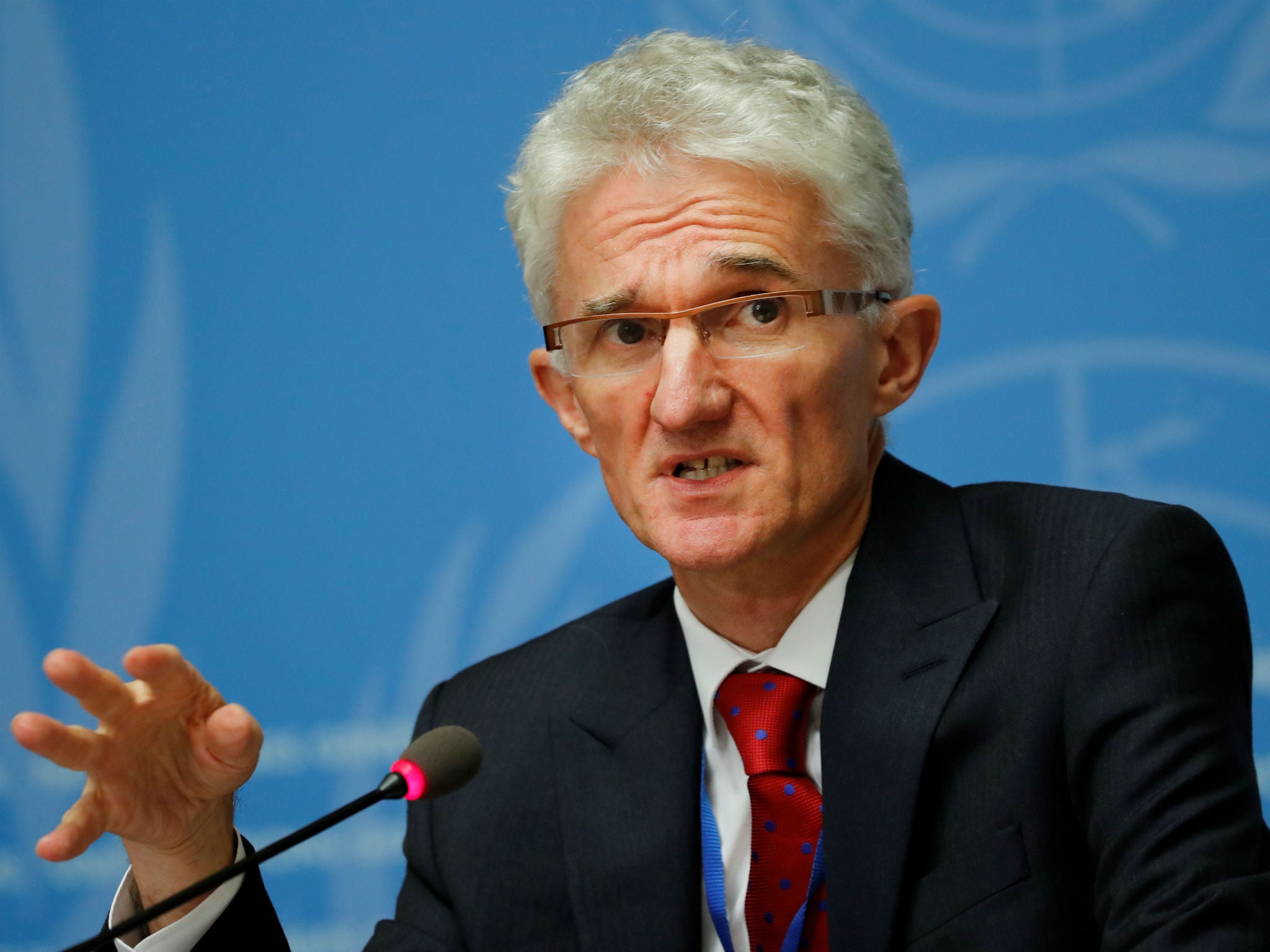UN warns of 'worst humanitarian disaster' of 21st century as 30,000 flee Syria's Idlib ahead of offensive
International observers believe that up to 800,000 people could flee Idlib province

Your support helps us to tell the story
From reproductive rights to climate change to Big Tech, The Independent is on the ground when the story is developing. Whether it's investigating the financials of Elon Musk's pro-Trump PAC or producing our latest documentary, 'The A Word', which shines a light on the American women fighting for reproductive rights, we know how important it is to parse out the facts from the messaging.
At such a critical moment in US history, we need reporters on the ground. Your donation allows us to keep sending journalists to speak to both sides of the story.
The Independent is trusted by Americans across the entire political spectrum. And unlike many other quality news outlets, we choose not to lock Americans out of our reporting and analysis with paywalls. We believe quality journalism should be available to everyone, paid for by those who can afford it.
Your support makes all the difference.The United Nations has warned of the potential for the “worst humanitarian catastrophe” of the 21st century over the impending assault on the rebel-held Syrian enclave of Idlib by the forces of President Bashar al-Assad.
The UN agency coordinating relief efforts in war-ravaged Syria said that 30,000 people had already been displaced, amid air strikes by Russian and Syrian government troops, and that another 800,000 could move, triggering a massive crisis. Up to three million civilians live among the farmlands and agricultural hubs of Idlib, which is militarily dominated by rebel groups that include a large contingent of fighters inspired by al-Qaeda.
“There needs to be ways of dealing with this problem that don’t turn the next few months in Idlib into the worst humanitarian catastrophe with the biggest loss of life of the 21st century,” Mark Lowcock, chief of the UN’s Office for the coordination of humanitarian affairs, told a news conference in Geneva on Monday. “We are very actively preparing for the possibility that civilians move in huge numbers in multiple directions.”
More than a half million people have been killed and millions displaced in Syria’s seven-year war. The conflict pits a ragtag opposition backed by Turkey, the Gulf states and the West against the Damascus rule of Assad, aided by Russia and Iran. Isis, which surged in 2014 and once held dominion over a massive stretch of the country, continues its insurgency.
Idlib stands as among the last significant chunk of Syria to be held by the opposition. Fresh off victories against rebel enclaves near Damascus and in southern Syria, the capital’s ground forces are said have been building up on the outskirts of Idlib and airstrikes by Russian and Syrian jets and artillery have pummeled the region.
Idlib’s rebel-run schools suspended classes in several towns due to the bombardment. Scores of civilians have been killed and injured, according to war monitoring group the Syrian Observatory for Human Rights. Three hospitals, two headquarters of the Syrian Civil Defence, and an ambulance service were struck and put out of service since 6 September, according to the Union of Medical Care and Relief Organisations, a pro-opposition advocacy group.
“The bombing hasn’t stopped, it’s ferocious,” Ibrahim al-Hamawi, a 25-year-old father in Idlib told Syria Direct, an independent news organisation focusing on the country. “I don’t know where my family and I can go now.”
Mr Assad’s quest to take Idlib is complicated by Turkey, which has positioned troops and rebel forces throughout the province as part of previous deals hammered out with Iran and Russia. Turkey and its allies also control a stretch of Syrian borderland east of the Euphrates River. An attempt by Moscow, Ankara, and Tehran last week to hammer out a deal on Idlib collapsed amid disagreements that were broadcast live on television.
Syrian opposition news outlets say 20,000 rebel fighters are set to repel Damascus’ impending offensive. Many fought Assad in other parts of Syria but relocated to Idlib as part of truce deals. “It is our duty to defend Idlib in case it came under attack by the regime and its allied militias,” rebel armed forces spokesman Mohammed Hamadin told the opposition news website Enab Baladi.
In contrast to rebel enclaves in Damascus, Aleppo, and southern Syria, the Idlib enclave poses no direct threat to nearby loyalist areas. Damascus, Moscow, and their western allies have instead warned that the rebels were planning to attack with chemical weapons, a propaganda ploy they have reputedly used to obscure the origin of illegal war tactics that western governments, the UN and the OPCW have repeatedly stated are being launched by Mr Assad’s troops.
The US and other western governments have warned the Syrian regime not to use chemical weapons in the Idlib offensive. Even Germany is said to be considering retaliatory airstrikes against regime positions should it deploy chemical weapons which in the past have allegedly included chlorine and sarin.
“A few days ago, we decided to warn the regime and its allies against any further use of chemical weapons,” France’s armed forces minister Florence Parly said in a radio interview on Sunday. “We confirm that this was a red line and remains so, and when you cross a red line you must expect a response, specifically from France.”
But even if the regime refrains from using chemical weapons, western officials are bracing for the disruptive impact of the offensive. Turkish officials have warned that they won’t prevent refugees fleeing Idlib from trying to reach Europe and furthering fanning xenophobia across the continent. “We fear a humanitarian disaster,“ said Ms Parly. “France is doing its utmost to prevent this carnage.”
Join our commenting forum
Join thought-provoking conversations, follow other Independent readers and see their replies
Comments